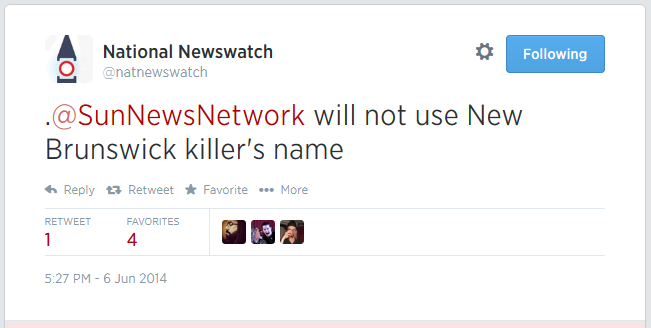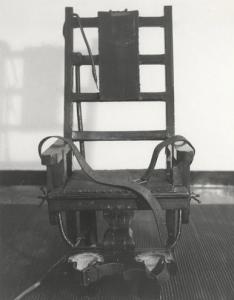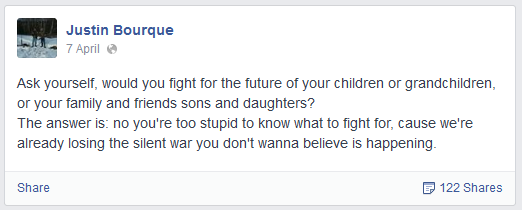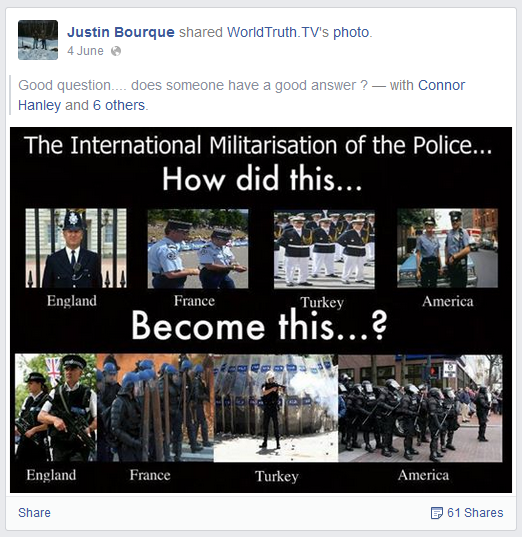
Sun News Network not to use Justin Bourque’s name (Tweet by National Newswatch)
We should remember the officers and their stories. Their names were David Ross, Fabrice Georges Gevaudan, and Douglas James Larche.
But we shouldn’t apologize for being interested in Justin Bourque and his story. After all, he is the person who did the shooting, therefore the story of why and how this shooting took place is much more in Justin Bourque’s story, and hardly at all in the officers’ stories. Yes, tell the stories of the officers, respect them and honour them. But this isn’t necessarily a zero-sum game. Honouring the officers does not necessitate obliterating Bourque from our consciousness. There is plenty of airspace.
Fortunately and unfortunately, there is only one Justin Bourque. I say unfortunately because it’s hard to do science on a sample size of one. We can do no better than to have hunches or guess at what events led to the behaviour, as people and their behaviours are absurdly complex. But erasing him is counterproductive, self-defeating. While it’s not going to be easy or even necessarily possible to come to any useful, potentially falsifiable conclusions, erasing the information will ensure that it’s impossible to do so. For now, let’s save everything. We don’t have to stare at it, no, but that’s something that should be up to us as individuals.
It’s almost… almost! like some elements of the Great Media Machine are trying to grift us with Three-card Monte. The money card might be there somewhere, but we’re encouraged to turn up distractions. But I’m not quite cynical enough to believe that Sun News Network doesn’t believe that what they’re doing is in the broader public interest.
Some people think Justin Bourque did this at least partly for the notoriety, and maybe that’s a factor. But looking at his Facebook will tell you that he must be at least slightly ideologically motivated. And either way, notoriety or ideology, we still give a shit about stuff like this not happening. We must not let our retributive don’t-give-him-what-he-wanted tendencies to lead us to cut off our noses to spite our faces.
Or this is all because we’re not caring enough about the mentally ill, you say? You may be half right, inasmuch as we’re not caring enough about the mentally ill, but was that the cause? And while we’re thinking about it, to what extent are we causing the “mental illness”? Is there something about our winner-take-all all’s-fair-in-getting-ahead sexual-puritanical authority-worshipping institutionally-and-structurally-unfair culture that foments violent rebellion, even absent tangible neurological deficits such as an axe through the skull? Let’s not arrogantly dismiss this as impossible.
Imagine if someone had bombed an abortion clinic. Deplorable, sure, even if you are against abortion.1 But would you think this was a threat to people in general? That you would be targeted even if you were a card-carrying social conservative dutifully avoiding the clinic? Clearly, there’s something ideological about this. That doesn’t make the ideology ‘right’! But to say this person is mentally ill for shooting police doesn’t make any more sense than saying someone is mentally ill for bombing an abortion clinic. It’s their beliefs, goddammit. It’s a failure of philosophy, not of medicine.
Not that having a belief means you have to immolate yourself over it. Having a belief usually doesn’t mean you must abandon all sense of proportion… well, uh… maybe it depends on your belief. Still, if you agreed with one or two things he posted on his Facebook – hell, even if you agreed with everything – it doesn’t make you a roaming shooter. Among other things, he posted this Onion video, something I might well have posted myself:
And I don’t mean to suggest that social conservatives wouldn’t have any reason to fear in the abortion clinic example: There, as with this, the threat to unconnected individuals is getting caught in the crossfire. Bourque was clearly enough targeting police. While I wouldn’t advise cornering such an individual, the lockdown was for the safety of the police as much as it was for the rest of us. If people had been permitted to go on about their business, it would have been much easier for him to sneak around and carry out his guerrilla war on police.
Inasmuch as this was “your protectors are in danger, therefore you are in danger,” I for one am a little bit cynical. 1) A lot of violence happens among people known to each other, which the police can do little to prevent. 2) To some extent, the police are here to hold the lid down on a pot of boiling water. They’re here to keep the poor from killing the rich. When there isn’t enough of that to do, they need to set up speed traps and bust lots of people not harming anyone in order to justify their existence. They reflect a society being run on authority-informed-reason instead of reason-informed-authority. Without their strong-arm pressure, society as we know it would explode. Or would it? Either way, it’s a far-from-ideal situation, if not outright dystopian.
When someone acts out explosively or egregiously, it doesn’t mean that their cause is wholly unjust. How would we, knowing what we know now, react to the news that an escaped slave in the antebellum South managed to get hold of a gun and then proceeded to shoot every white person he came across?2 I’m not saying we’re thralls to the government in anything like the same way – if I receive official reprisals from posting this, and I don’t believe I will, I believe I can fight them with the pen and even win – but we shouldn’t not-consider a motivation just because the act it motivated was deplorable.
Modern governments are to the efficient solution of common problems as modern marriage is to natural human relationships — in both cases, there is only a superficial resemblance, and in both cases, what was once a symbol has become a thing. Government has become so much a thing unto itself that it is now essentially separate from human society, to the degree that governments regularly pass laws and collect taxes in the interest of, and for the furtherance of, government itself — laws and expenditures having nothing to do with the interest of the people the governments were originally designed to serve.
One might think, reading my harsh indictment of government, that I must side with those who blow up government buildings. Nothing could be further from the truth — in fact, every fruitcake that blows up a government building thereby assures an increase in governmental power. This is because government’s effects are mostly out of sight (and mind), and to an average person those effects are benign compared to the wholesale slaughter of innocents whose only mistake was to be near (or in) that day’s randomly selected building. This is a fundamental truth that Mahatma Gandhi recognized, but that we have largely forgotten — violent opposition is the bread and butter on big government’s table.
The real solution to excessive governmental power is education. People must learn the difference between a symbol (government) and a thing (effective group action), and they must come to believe in themselves and the natural value of individual experience. If people educate themselves to the point that they realize their own power and capabilities, huge governments will lose their audience. And make no mistake about it — big government isn’t just like show business, it is show business: no audience, no show.
– Paul Lutus, “How we confuse symbols and things”
In the coming months and years, we will prove our reason, civility and restraint by not treating Bourque in an exceptional manner. We won’t give him an absurd 1,300-year sentence. We won’t encourage people to rape him in prison. We won’t let officers take turns beating him up. The story of Bourque’s journey through the legal system ought to be prescribed reading for insomniacs. (Update: Bourque has pleaded guilty.) And as long as I’m dreaming, I’d like to see a guaranteed minimum income system.
Still, and maybe I’m only speaking for myself here, but I’m far more concerned about the person who would kill me not killing me than I am about how he would be hung denuded on a meat hook in a walk-in freezer after the fact. Misery + Misery = 2 * Misery. The objectives of sentencing should be to 1) deter people from trying the same thing and 2) protect the rest of us from the person who did the thing. Anything more than that is needlessly tyrannical.

“Old Sparky”, the electric chair used at Sing Sing prison (Wikipedia)
Some people will propose bringing back the death penalty. I would like to point out that people in Japan have gone on killing sprees with the intent of receiving the death penalty. Suicide by school shooting. Seriously. I’m inclined to believe we should think of the money it takes to keep someone in prison for life a small price to pay for fewer massacres. But this is just a gut feeling; I have no evidence.
An acquaintance of mine made a remark on Facebook: “GTA: Moncton.” The blowback he got!4 I thought it was hilarious and appropriate, perhaps a rib on our habit of playing video games where shooting police is de rigueur. But I love satire more than most people. Here’s what he’s saying today, as part of a response to the response:
“As I finished typing this, I read about a standoff in Dartmouth this morning. Police are on the scene with assault rifles. What the hell? Is this becoming normal? It hasn’t even been a week!”
Excepting a very much understandable hypersensitivity5 for the next while, we should be careful not to allow this to become a excuse for increasing police powers or numbers. 9/11 was horrible but it became more horrible by enabling new Afghan and Iraq wars. If we actually gave a shit about what the Taliban of Afghanistan were doing to women and free-thinkers (long before 9/11), we would have done more than forward e-mails among ourselves. With Iraq, even though Hussein was nigh-absolutely a Bad Guy™, it’s clear we didn’t come close to appreciating what we were fucking with. The direct death toll of 9/11 itself is 2,996, but stacked against the figures from either or both wars, it doesn’t compare. In fact, we lost more than as many on “our side” again in each war. Similarly, the misery that we’d impose on ourselves for further militarizing the police could be felt for lifetimes and beyond. In a nutshell, I’m a little bit worried that incidents like this will do for liber(tarian,al)s what 9/11 did for our understanding of Muslims.
The police are where the rubber of the political machine meats the road: We can and must deal with the police by engaging their political masters. And when we do so, we set an example that may obviate the fomentation of more Justin Bourques. And that’s the thing I think we should care most about.
Further reading:
Ken MacQueen and Patricia Treble, Maclean’s – “Too many cops?”
Sue Montgomery, Postmedia News – “Justin Bourque’s parents sought help for troubled son but police ‘couldn’t do anything’”
Tamsin McMahon, Michael Friscolanti, and Martin Patriquin, Maclean’s – “The untold story of Justin Bourque” (Published on June 15 – long and detailed. Was originally called “What made him snap.”)
Perhaps especially if you are against abortion, since people will associate you with the bombers, making the task of bringing people to your point of view much more difficult for you. ↩
Maybe he has runaway slave disorder! ↩
You know, I don’t like how the Government of Canada website shows itself as being at canada.ca. Canada and the Government of Canada aren’t necessarily the same thing. gc.ca is infinitely more appropriate. ↩
And blowback-on-the-blowback. Maybe it’ll make the next Encyclopædia Dramatica. ↩
After Columbine, police came to my high school and questioned me following a complaint about a non-existent hit list on my website, which apparently neither the complainant nor the police had bothered to look at themselves. (But it was harder to find then. The URL was geocities.com/Athens/Academy/3549.) On the website I had, “Want to see my non-existent hit list? Click here!” and it took you to a mock 404 page where I said if I really had a hit list, it would be there. ↩




